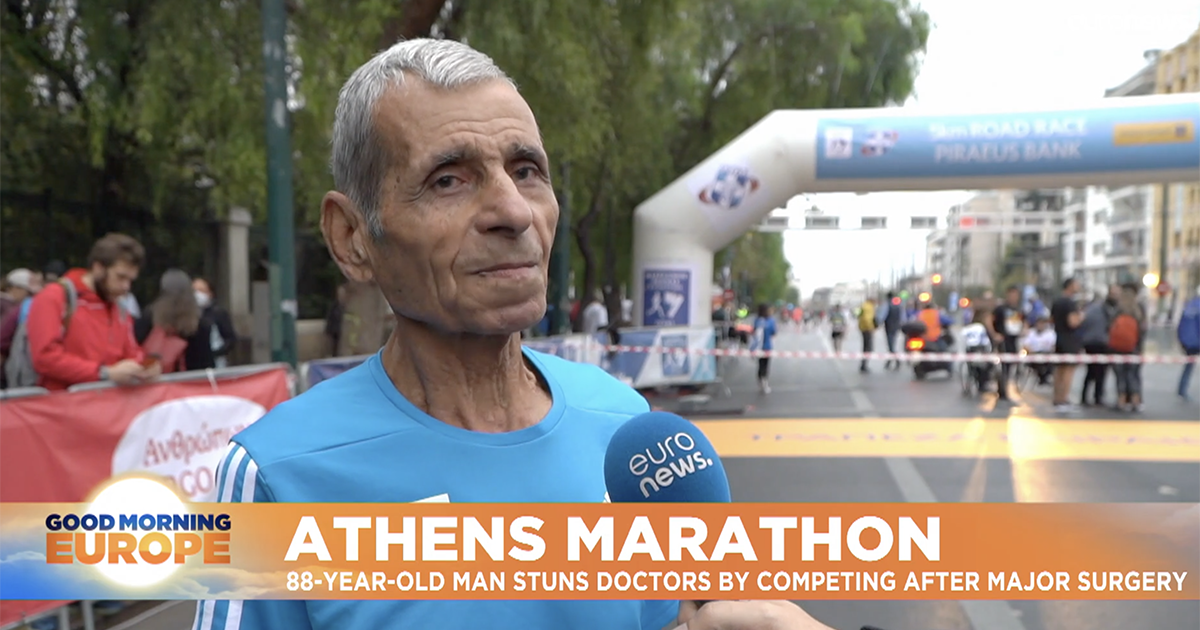What is a Gastrectomy?
- Panagiotis Dousis is turning heads for running a 5k race at age 88. But his age isn't the only reason people are impressed, as he also doesn't have a stomach due to a cancer diagnosis.
- Now that he can check running a 5k off his bucket list, he's setting his sights on a much harder race: a marathon.
- Dousis had a total gastrectomy, which is when the surgeon removes the entire stomach, nearby lymph nodes and the omentum.
"When I run abroad and people hear my name, like that time when I ran in Belgrade (the capital of Serbia), they say that, 'Dousis is the only person on Earth who runs without a stomach,'" Dousis tells Euronews.
Read MoreCancer Diagnosis & Getting Back to Running
It was about seven years ago at age 81 when he received the news that he had stomach cancer.
"One morning I went to the doctor and I told him that I didn't feel well," Dousis recalls of his diagnosis. "He examined me and diagnosed (me with) stomach cancer. He said that I only had three more days to live and must immediately go to (the hospital in) Athens."
"I went to Athens and doctors asked me how old I was; at that time I was 81," he says. "They said that it was forbidden to undergo such surgery at my age."
Since his doctors believed at the time that Dousis couldn't have surgery, they said they could give him chemotherapy treatments and he would "maybe" live for another three, four or even five years. But that wasn't enough for Dousis; he wanted to get back to running.
"I said I would get the surgery or remove the cancer myself and I'll be fine," Dousis says. "But then the doctor said to me, 'What you just said will save you because you have courage.'" And that courage is the reason he's alive today, as he went through with stomach removal surgery.
What is a Gastrectomy?
A total gastrectomy is when your surgeon removes your entire stomach, nearby lymph nodes and the omentum. And your doctor may even remove the spleen and parts of the esophagus, intestines, pancreas or other nearby organs if the cancer has reached them.
How does your body operate without a stomach? Once the stomach is removed, the end of the esophagus is then attached to part of the small intestine. This allows food to move down the intestinal tract. But people who have had their stomach removed can only eat a small amount of food at a time. Because of this, they will need to eat more often.
This operation is done if the cancer has spread widely in the stomach, ACS reports. It is also often advised if the cancer is in the upper part of the stomach, near the esophagus.
Amy Armstrong, a breast cancer survivor who also had to get her stomach removed because of a genetic predisposition to cancer, tells SurvivorNet that she really wasn't prepared for life immediately after surgery. Amy had to get a prophylactic gastrectomy which means she got her entire stomach removed to prevent a very aggressive type of stomach cancer. She says that before the operation, she was very active, and in really great shape; dealing with the side effects really put her in a tough place mentally.
"Unfortunately, I developed an infection while I was going through my surgery, which required me to have a second surgery and was in the hospital for up to a month," Armstrong says. "I was in a lot of pain … lost a lot of weight, could not eat, couldn't walk. It really shook me completely from what I had known to be my day-to-day life. I fell into a massive depression and had to get help, because I just couldn't get through it. Luckily, I persevered."
Armstrong says that she had to learn to deal mentally with the slow days and hours as her body healed and she had to learn to have faith in her body as well. "The human body is amazing … how it can heal" she said. And this is something Dousis can surely attest to as he sets his sights on running a marathon post-surgery.
Learn more about SurvivorNet's rigorous medical review process.


